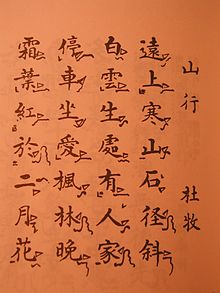Shigin
Shigin ( jap. 詩 吟 ) is an art of reciting or singing Japanese poetry .
Individual poems are referred to as gin ( 吟 ). They usually consist of four or more lines written in Chinese characters or in Kanji . All lines have an identical number of characters. Gin , which consists of four lines of seven characters each, is called shichigon-zekku ( 七言 絶句 , "seven-word sentence").
There are about 5000 different ways to recite the poems in different melodies and with them all human feelings can be expressed.
history
Shigin are believed to date from the first millennium BC. And originated in China . Originally they were sung exclusively in Chinese, but later also in Japanese reading. Shigin is still practiced in this form today.
Shigin is the oldest Japanese poem form. It is used less often than, for example, the poem Haiku and is mostly only used by older generations. Gin are also used in Buddhism .
Still, Shigin continue to have an impact on Japanese culture. They are often found in textbooks and play a role in calligraphy.
